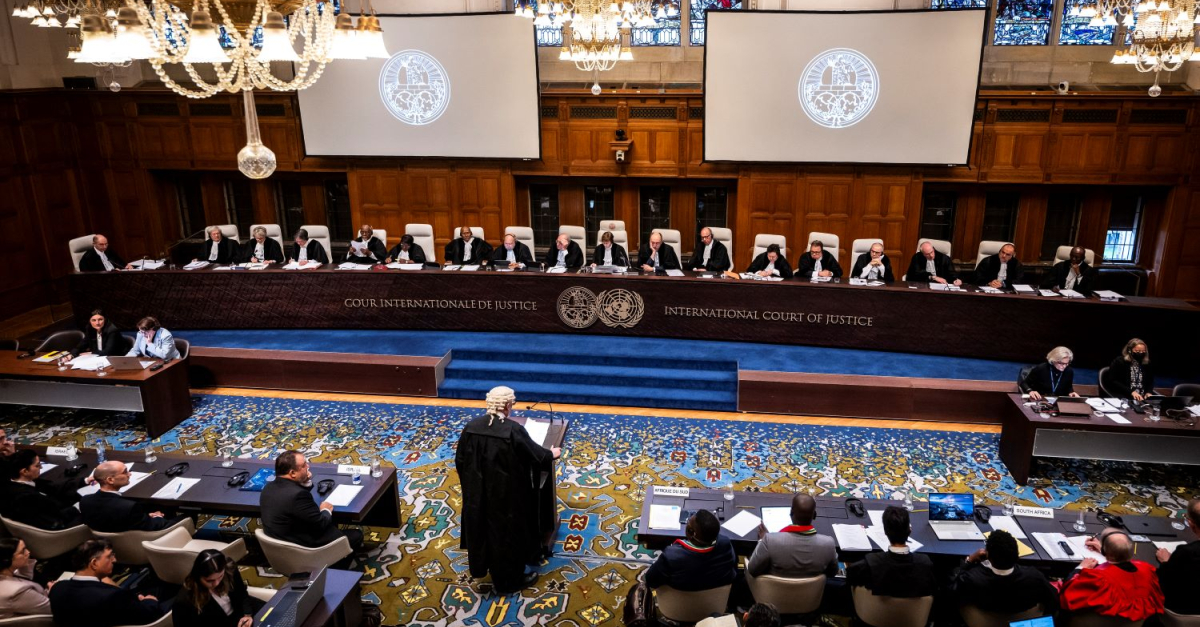This year, The Permanent Court of Arbitration (PCA) celebrates its 125th anniversary. The Court, which has been headquartered at The Hague’s Peace Palace for more than a century, has been remarkably constant in its role at the heart of international cooperation, despite the world around it changing immeasurably since 1899.
The Permanent Court of Arbitration
The types of arbitrations being brought in front of the Court are evolving too. Once focused on border and maritime disputes, it is now hearing complex international cases around thoroughly modern issues such as climate change, the environment, and migration. What sets the PCA apart from other judicial institutions is its flexibility in appointing expert arbitrators to hear each case, and its willingness to work alongside conflicting parties to choose the appropriate procedure to bring about a satisfactory resolution to each dispute.
Picture: A hearing in the PCA's Administrative Council Chamber in the Peace Palace
To celebrate the PCA’s anniversary, we looked at several landmark cases that highlight the evolution of the world’s oldest standing forum for international dispute resolution.
The first case: The Pious Fund of the Californias - 1902
The very first PCA case involved a dispute between the USA and Mexico over the funding of Catholic missions to California - which was then under Spanish administration. An 1875 ruling had determined that Mexico should pay interest on a “Pious Fund” held by the Mexican treasury to support the works of the US Catholic Church. Initially, Mexico made regular payments, but it then unilaterally stopped and refused to continue these payments. The United States brought the case to the PCA in 1902.
What is extraordinary is that, within three years of the court’s founding, delegations from the United States and Mexico travelled halfway around the world to put forward their cases to a completely untested court in a small seaside city in the Netherlands. The case perfectly illustrates the burgeoning influence of the international community on these types of disputes, and the eagerness of nations to be seen to comply with this new brand of arbitration.
For the record, the PCA Arbitral Tribunal decided that the 1875 ruling was binding and Mexico was obligated to comply with it by continuing future payments. Mexico accepted and complied with the order, until it finally settled the balance.
The case is still cited today as a precedent for the binding effect of and obligation to comply with decisions of international courts and tribunals.
The biggest investment arbitration case: The Yukos Arbitrations - 2005
The dispute between the Russian Federation and three of the major international shareholders of the Yukos Oil Company remains the largest investment arbitration in history. The shareholders alleged that Russian government interference in the running of Yukos resulted in the company going bankrupt and eliminating the value of their shares.
The PCA Arbitral Tribunals found unanimously that Russia had breached the internationally-recognised Energy Charter Treaty and awarded damages of more than $50 billion to the three shareholders.
Russia appealed to various courts in the Netherlands, and the case is still active almost 20 years later, but it illustrates the unique ability of the PCA to try large and complex cases using international experts. The neutrality of the court and its standing within the international community makes it the only organisation capable of delivering verdicts that are unencumbered by the vested interests of domestic courts.
A new type of case: The Bangladesh Accord Arbitrations - 2016
The 2013 Rana Plaza factory collapse in Dhaka, Bangladesh was the world’s deadliest accidental structural failure in modern history, killing more than 1,100 people. In the wake of the disaster, the Bangladesh Accord was signed by workers unions, apparel brands, importers and retailers to establish a new fire and safety building programme. In 2016, two global unions brought arbitration cases against two large global fashion brands for allegedly failing to comply with the new standards agreed in the Accord.
Picture: Signatories of the Bangladesh Accord (which has since been expanded to other countries and is now called “The International Accord for Health and Safety in the Garment and Textile Industry (International Accord)”
The case was settled by the fashion brands before the PCA arbitral tribunal rendered a decision - simply bringing the matter to the attention of the world via the announcement of a PCA tribunal was enough to encourage the brands to fulfil their obligations under the Accord. This case was noteworthy as it marked a significant shift towards global recognition of the human rights of workers - wherever they are in the world.
A peaceful resolution to a deadly conflict: The Abyei Arbitration - 2008
For more than 20 years Sudan was engulfed in a bitter civil war that claimed the lives of two million people. Eventually, in 2008, the Government of Sudan and the Sudanese People’s Liberation Movement deposited an Arbitration Agreement with the PCA regarding the demarcation of the Abyei region in between Northern and Southern Sudan.
Due to the political tension and threat of escalation, the PCA expedited the proceedings, coming to a resolution within a year, and providing new definitions for the Abyei boundaries. The decision facilitated the greater Sudanese peace process and was instrumental in the progression of South Sudan becoming an independent state in 2011.
Picture: The Abyei Arbitration
For 125 years, it has been the embodiment of calm, rational, objective arbitration, transcending national interests and delivering verdicts that are respected by the international community.
And the evolution of the caseload looks set to continue, with future arbitrations involving cybersecurity, artificial intelligence, and satellite jurisdiction in outer space seemingly just around the corner.
1Read more around the International City of Peace and Justice

ICMP brings new hope to the families of missing people
The International Commission on Missing Persons (ICMP) works with governments and civil society to address the issue of people who have gone missing.

The International Court of Justice: a constant in a multi-polarized world
The ICJ in The Hague, their role, work and the difference between the ICC.
